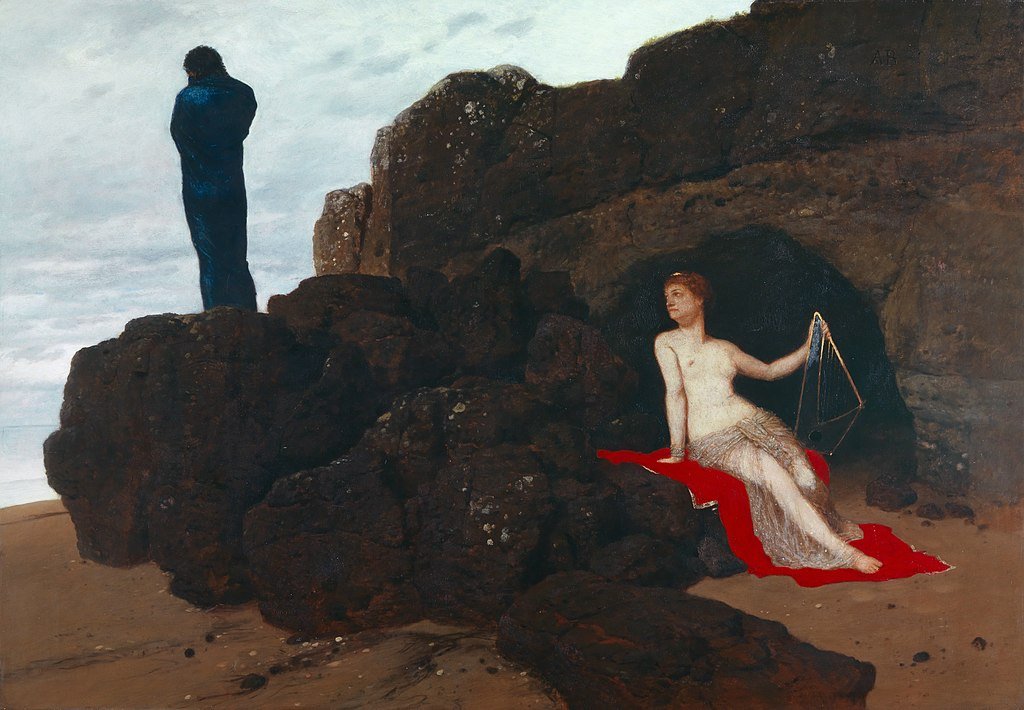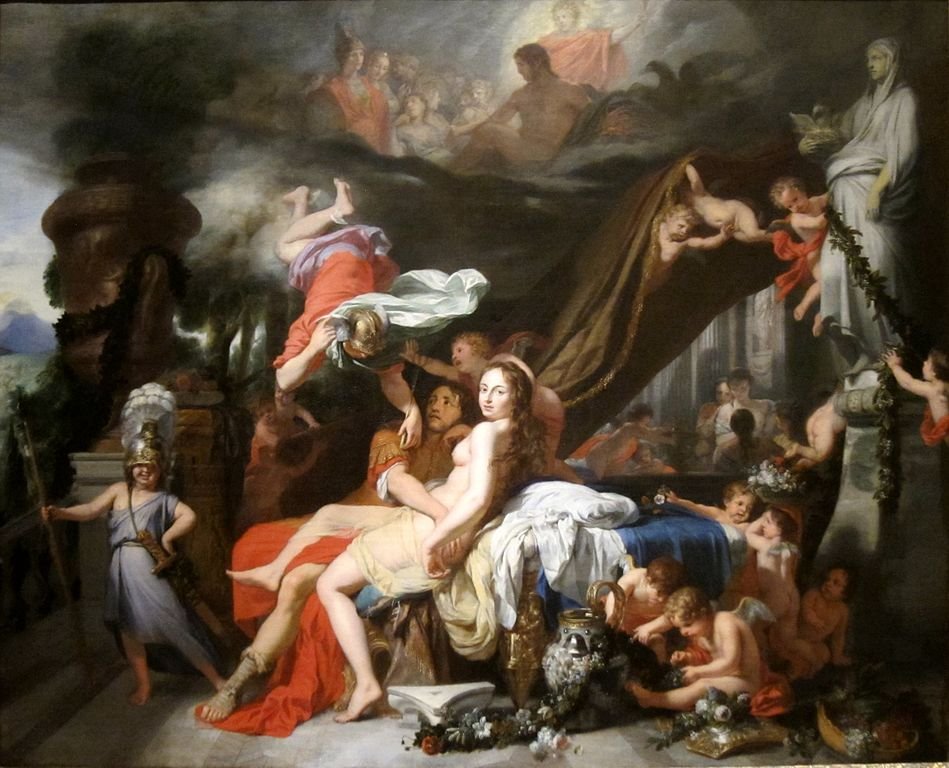The Greek myth of Calypso and Odysseus is a captivating tale of unrequited love. Calypso, a charming sea nymph, enticed Odysseus, ensnaring him in her charms and detaining him for seven years, estranged from his faithful wife, Penelope. This story takes a turn with the intervention of the wise goddess Athena. Eventually, Calypso is compelled to release Odysseus, even facilitating his boat’s construction to aid his departure.

Calypso emerges as a complex figure, embodying both negative and positive connotations. As a concealer of Odysseus, drawing him into her seductive realm, she assumes a negative aspect, akin to a cunning enchantress. However, her role in assisting Odysseus’ departure and saving him from perilous circumstances casts her in a more favorable light, akin to a benevolent savior.
The Characters
Calypso: In ancient Greek mythology, Calypso, the enchanting nymph and daughter of the Titan Atlas, resided on the mystical island of Ogygia. As recounted in Homer’s Odyssey, she held the cunning hero Odysseus captive for a long period of seven years.
Odysseus: Within the realms of Greek and Roman mythology, Odysseus, recognized as Ulysses in its Latin rendition, emerges as a fabled monarch ruling over Ithaca. He stands as the central figure in Homer’s revered epic narrative, the Odyssey, which traces his intricate voyages and trials. Notably, Odysseus assumes a pivotal mantle in Homer’s Iliad and various other literary creations, further solidifying his indelible presence within these mythic sagas.
Odysseus Meets Calypso At Ogygia
Calypso resided on the island of Ogygia, where her imprisonment occurred due to her allegiance to her father during the Titans and Olympians’ conflict. The island’s precise location remains an enigma, with multiple possibilities. Homer introduced the tale of Calypso and Odysseus in Ogygia, yet many experts view his settings as more mythical than factual.
Speculations place the island in the western Mediterranean, particularly the Ionian Sea. Regardless, Ogygia was where Calypso extended her hospitality to Odysseus, the weary Greek hero. He found refuge after being adrift for nine days, following the loss of his ship and crew to the perils of Italy and Sicily, during his homeward journey from Troy.
Odysseus and Calypso at Ogygia
Captivated by Odysseus, the mythical Calypso yearned to share eternal life as his spouse. Despite her ardent advances, Odysseus remained resolute in his desire to return to his homeland, Ithaca, and his wife. Undeterred by his rejection, Calypso’s unwavering affection compelled her to persistently woo Odysseus.
Eventually, her devotion led them into a passionate relationship. They resided for seven years within her mesmerizing cave abode. Accounts differ: Hesiod suggests Calypso bore two children, Nausithous and Nausinous, while Apollodorus claims a son named Latinus. Whether Odysseus was truly ensnared by Calypso or his yearnings waned over time amid her nurturing care and affection remains uncertain.
Athena Asks Zeus to Help Odysseus
Odysseus reached a point where he yearned for change. The separation from his wife, Penelope, became unbearable, and he desired to confide in Calypso. He often found himself seated on a headland, overcome with sorrow, and at night, he was compelled to share her bed against his own wishes. The intervention of Goddess Athena played a crucial role. She requested Zeus to “rescue” Odysseus from Ogygia and Calypso’s grasp.

As a result, Zeus dispatched the divine messenger, Hermes, to sway Calypso into releasing Odysseus. While Calypso could not defy Zeus, the supreme ruler of the gods, she harbored a mix of fear and resentment. Addressing Hermes, she lamented the gods’ cruel jealousy, unable to tolerate a goddess’s companionship with a mortal, even when it was openly chosen as a legitimate union.
Calypso equipped Odysseus with essential tools – an axe, drill, and adze – to construct a boat. Guiding him to an island abundant with timber, she enables him to fell trees and craft planks for the vessel. Calypso’s assistance extends beyond tools; she supplies him with provisions like wine, bread, and clothing, along with additional materials required for boat-building. Furthermore, she blesses his departure by setting favorable winds to aid his voyage.
However, despite Calypso’s belief that she has rescued Odysseus, the goddess experiences profound anguish and torment upon losing her beloved companion of seven years. Stricken with despair, Calypso attempts to end her immortal existence, but her immortality subjects her to excruciating pain and suffering instead.
Relationship of the Myth With The Epic of Gilgamesh
The tale of Odysseus and Calypso bears striking similarities to the encounters between Gilgamesh and Siduri in the Epic of Gilgamesh. In both narratives, a solitary female figure offers solace to a grief-stricken and restless hero. She provides them with drink and guides them towards a distant realm over the sea, a sanctified abode reserved for esteemed individuals.
Moreover, a crucial aspect of their journey involves the laborious task of felling and refining timber to prepare for their voyage. This parallel underscores the universal themes of longing, transformation, and the arduous pursuit of purpose that transcend cultural boundaries.
Summary of The Myth of Calypso And Odysseus
Calypso, an Oceanides sea nymph and daughter of Titan Atlas, embodies allure and diversion. The Greek myth unfolds as she captivates Odysseus, detaining him for years on Ogygia, and thwarting his return to Penelope. Her complex role intertwines negative and positive aspects, from seductress to potential rescuer.
Nestled in Ogygia, a mystical island with a disputed location, Calypso’s love for Odysseus blossoms, yet his yearning for Ithaca prevails. Their intertwined affair spans seven years, culminating in Odysseus’ release, facilitated by Athena and Zeus.
Despite her sorrow, Calypso aids his departure, defying Zeus’ command out of love. This tale raises profound questions about desire, fate, and the influence of divine beings, leaving Calypso’s legacy as a symbol of both enchantment and liberation.
Also Read: Hades and Persephone: A Tale of Love and Mythical Symbolism
